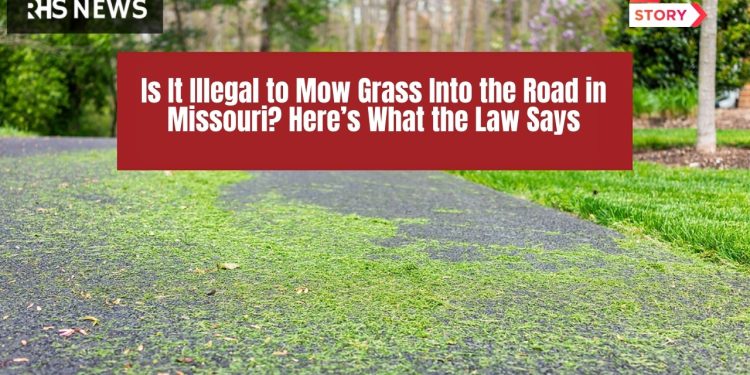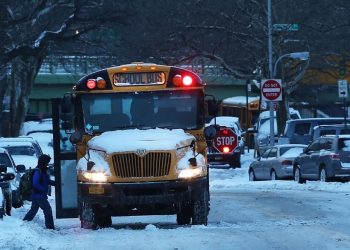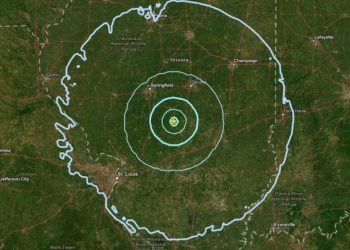When the summer mowing season arrives in Missouri, many homeowners face the common practice of discharging grass clippings onto nearby streets. While this might seem like a convenient disposal method, Missouri residents should be aware that this practice is not only dangerous but also carries significant legal consequences. Understanding the specific laws and ordinances governing grass clippings can help property owners avoid hefty fines and, more importantly, prevent serious accidents.
The Legal Framework Governing Grass Clippings in Missouri
This Article Includes
- 1 The Legal Framework Governing Grass Clippings in Missouri
- 2 Municipal Ordinances Across Missouri Cities
- 3 The Serious Safety Hazards of Grass Clippings on Roads
- 4 Environmental and Infrastructure Consequences
- 5 Penalties and Enforcement Mechanisms
- 6 Proper Disposal Methods and Best Practices
- 7 The Role of Education and Community Awareness
- 8 Conclusion
Missouri operates under a comprehensive legal structure that addresses the disposal of grass clippings on public roadways. The state’s approach involves both state statutes and local municipal ordinances that specifically prohibit the discharge of yard waste onto streets, sidewalks, and storm drainage systems.
At the state level, Missouri Revised Statute Section 229.150 establishes broad protections for public roadways by prohibiting any person from willfully and knowingly obstructing or damaging public roads. This includes activities that interfere with drainage systems or create hazardous conditions for travelers. While this statute doesn’t explicitly mention grass clippings, it provides the legal foundation for enforcement actions against property owners who create road hazards through improper disposal practices.
The real enforcement power, however, lies within municipal ordinances that directly address grass clippings. Cities across Missouri have implemented specific regulations that make it illegal to deposit grass clippings on public streets, sidewalks, or drainage systems. These local laws carry misdemeanor penalties and can result in both fines and potential jail time for repeat offenders.
Municipal Ordinances Across Missouri Cities
Kirksville’s Comprehensive Approach
The City of Kirksville has established one of the most detailed grass clipping ordinances in Missouri under Section 32-4 of their municipal code. This ordinance specifically prohibits the deposit of excessive amounts of grass clippings, leaves, mud, or other debris on sidewalks, streets, or curb and gutter areas. Kirksville officials emphasize that such contamination can plug stormwater inlets, resulting in flooding that affects entire neighborhoods during heavy rainfall events.
Property owners in Kirksville are required to maintain grass heights below eight inches and are responsible for mowing to the center line of any adjacent alleyways. Violations are handled through the Codes and Planning Department, which can be reached at 660.627.1272 for reporting violations or seeking clarification on proper disposal methods.
Laddonia’s Safety-Focused Regulations
The City of Laddonia has implemented City Ordinance Section 215.020, which specifically addresses nuisances affecting public health. This comprehensive ordinance includes grass clippings in its extensive list of prohibited materials that cannot be deposited on public property. The ordinance covers “all dead grass, grass clippings, dead limbs, leaves, brush, logs, weeds, foliage, shrub cuttings” and any other yard waste materials.
Laddonia officials issue citations for violations and emphasize the dual nature of the problem: environmental damage to stormwater systems and serious safety hazards for motorcyclists and other vehicle traffic. The city’s enforcement approach focuses on education combined with penalties, recognizing that many violations occur due to lack of awareness rather than intentional disregard for the law.
Smithville’s Clear Prohibitions
Smithville, Missouri has enacted City Ordinance 520.110 (A), which explicitly prohibits depositing any grass clippings into streets or sidewalks. The city has taken the additional step of providing visual examples of improper mowing practices to help residents understand what constitutes a violation.
Springfield’s Stormwater Protection
Springfield has implemented Section 96-27, which specifically prohibits putting lawn clippings or leaves in streets, gutters, or other portions of the stormwater system, including ditches and storm drains. This ordinance reflects the city’s commitment to protecting water quality and preventing flooding caused by blocked drainage systems.
The Serious Safety Hazards of Grass Clippings on Roads
Understanding why Missouri cities have enacted these strict ordinances requires examining the significant safety risks that grass clippings pose to road users. Grass clippings are approximately 85 percent water content, making them extremely slippery regardless of whether they appear wet or dry when deposited on pavement.
Motorcycle and Bicycle Dangers
Motorcyclists face the greatest risk from grass clippings on roadways. When clippings come between motorcycle tires and pavement, they eliminate the crucial contact patch that provides traction and stability. This is particularly dangerous on curves where motorcyclists depend on maximum tire-to-asphalt contact for safe cornering.
The slippery nature of grass clippings can force motorcyclists to take dangerous evasive actions, including sudden lane changes, crossing double yellow lines, or emergency braking that can lead to rear-end collisions. These emergency maneuvers often put motorcyclists at greater risk than the original hazard they were trying to avoid.
Statistics show that between 2004 and 2014, over 4,000 people died annually in motorcycle accidents across the United States, with many of these fatalities attributed to road debris including grass clippings. The years 2007 and 2008 saw particularly high fatality rates exceeding 5,000 deaths annually, highlighting the serious nature of road hazard-related accidents.
Impact on All Vehicles
While motorcycles face the highest risk, all vehicles can be affected by grass clippings on roadways. The slippery surface created by wet grass clippings can cause cars and trucks to lose traction during braking or cornering, particularly during light rain when the clippings become even more treacherous.
Emergency responders report that grass clipping-related accidents often occur with little warning, as drivers don’t anticipate the sudden loss of traction. This is particularly problematic in residential areas where speed limits are lower but drivers may not be expecting road hazards.
Environmental and Infrastructure Consequences
Beyond immediate safety concerns, grass clippings discharged onto streets create significant environmental and infrastructure problems that affect entire communities.
Stormwater System Damage
When grass clippings are blown or deposited onto streets, they inevitably wash into storm drainage systems during rainfall events. These organic materials can quickly accumulate and block storm drains, leading to localized flooding that can damage homes, businesses, and public infrastructure.
The Missouri Department of Transportation spends approximately $2.3 million annually on stormwater system maintenance, with a significant portion of these costs attributed to clearing organic debris from drainage infrastructure. Municipal budgets across Missouri allocate substantial resources to addressing drainage problems caused by improperly disposed yard waste.
Water Quality Impact
Grass clippings that enter storm drainage systems eventually reach local waterways without undergoing treatment processes. This organic matter contributes to nutrient pollution in streams, rivers, and lakes, leading to algae blooms, fish kills, and degraded water quality that affects both recreational use and drinking water supplies.
The Missouri Department of Natural Resources has identified yard waste as a significant contributor to nonpoint source pollution affecting the state’s water bodies. Cities like Springfield have implemented specific ordinances targeting this problem as part of their compliance with federal Clean Water Act requirements.
Penalties and Enforcement Mechanisms
Missouri municipalities have established various penalty structures for grass clipping violations, reflecting the seriousness with which local governments view these infractions.
Misdemeanor Classifications
Most Missouri cities classify grass clipping violations as misdemeanor offenses, carrying potential penalties that include fines ranging from $100 to $500 for first-time offenders. Repeat violations can result in increased fines and potential jail sentences of up to 30 days in municipal facilities.
Cities like Laddonia specifically state that “citations will be issued for failure to follow City code,” indicating active enforcement rather than warnings for first-time violations. This approach reflects the understanding that grass clipping violations create immediate safety hazards that require swift corrective action.
Progressive Penalty Systems
Many Missouri municipalities employ progressive penalty systems where violations result in escalating consequences. First violations typically result in written warnings or minimal fines, while subsequent violations within a specified timeframe trigger increased penalties and potential court appearances.
Property owners who fail to correct violations within specified timeframes may face additional charges for each day the violation continues, creating substantial financial incentives for compliance.
Proper Disposal Methods and Best Practices
Missouri property owners have numerous legal and environmentally responsible options for managing grass clippings that avoid the hazards and legal consequences of street disposal.
Mulching and Composting
The most environmentally beneficial approach involves leaving grass clippings on lawns where they decompose naturally and provide nutrients to the soil. This “grasscycling” method eliminates disposal concerns while reducing the need for chemical fertilizers.
For property owners who prefer to collect clippings, composting provides an excellent alternative that creates valuable soil amendments. Missouri Extension Service offices provide guidance on proper composting techniques that prevent odor and pest problems while creating beneficial organic matter.
Municipal Collection Programs
Many Missouri cities operate yard waste collection programs that provide scheduled pickup of grass clippings and other organic materials. These programs typically operate seasonally and may require special containers or disposal bags that meet municipal specifications.
Cities like Columbia, Kansas City, and St. Louis offer comprehensive yard waste collection services that divert organic materials from landfills while preventing improper street disposal. Property owners should contact their local public works departments for information about available programs and associated costs.
Private Disposal Services
Commercial landscaping companies and waste management services offer grass clipping disposal options for property owners who prefer professional handling. These services typically incorporate organic waste into commercial composting operations that produce soil amendments for agricultural and landscaping use.
The Role of Education and Community Awareness
Missouri communities have recognized that effective enforcement requires comprehensive education programs that help residents understand both the legal requirements and the reasons behind grass clipping ordinances.
Municipal Outreach Programs
Cities across Missouri have implemented public education campaigns that utilize multiple communication channels to reach property owners. These programs include information on city websites, utility bill inserts, community newsletters, and social media campaigns that highlight proper disposal methods.
The City of Kirksville operates a dedicated phone line for grass and weed questions, providing residents with direct access to code enforcement personnel who can answer questions and provide guidance on compliance strategies.
Seasonal Reminder Systems
Many Missouri municipalities issue seasonal reminders at the beginning of each mowing season, typically in April and May, when grass growth accelerates and violations tend to increase. These reminders often include specific information about local ordinances, penalty structures, and approved disposal alternatives.
Community Partnership Initiatives
Some Missouri cities have developed partnerships with local hardware stores, garden centers, and landscaping businesses to distribute information about proper grass clipping disposal. These partnerships help ensure that residents receive consistent information about legal requirements when purchasing lawn care equipment or services.
Conclusion
The practice of mowing grass clippings into Missouri streets is definitively illegal under both state statutes and municipal ordinances throughout the state. These laws exist to protect public safety, prevent environmental damage, and maintain critical infrastructure systems that serve entire communities.
Property owners who continue to discharge grass clippings onto public streets face misdemeanor charges, financial penalties, and potential liability for accidents caused by hazardous road conditions. More importantly, this practice puts motorcyclists, cyclists, and all road users at serious risk of injury or death.
Missouri residents have numerous legal and beneficial alternatives for managing grass clippings, from grasscycling and composting to municipal collection programs and private disposal services. By choosing responsible disposal methods, property owners can avoid legal consequences while contributing to safer roads and healthier communities throughout the Show-Me State.
The message from Missouri lawmakers and municipal officials is clear: keep grass clippings off the roads, protect your neighbors, and comply with the law. The convenience of blowing clippings into the street is never worth the potential consequences for safety, the environment, and your wallet.









